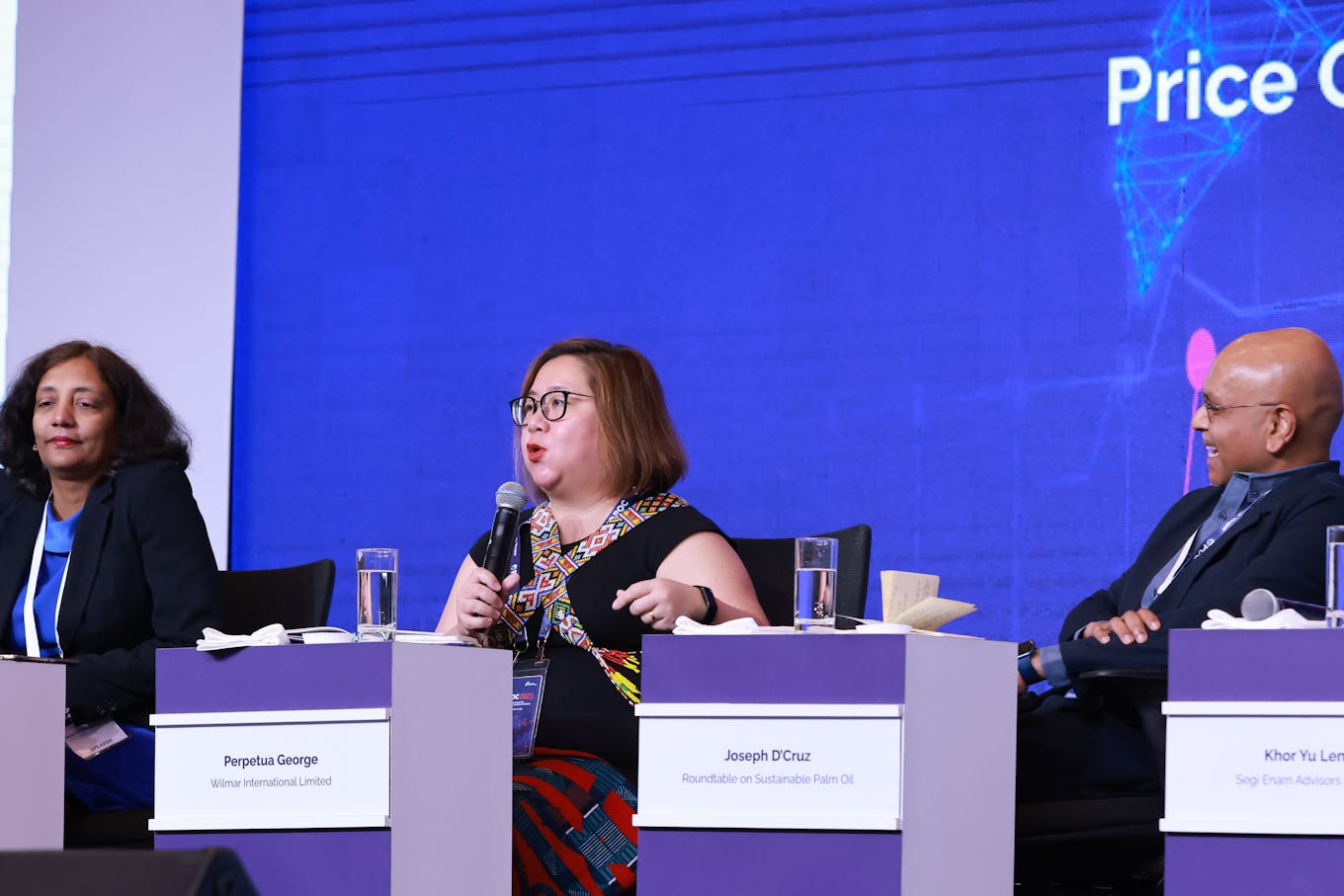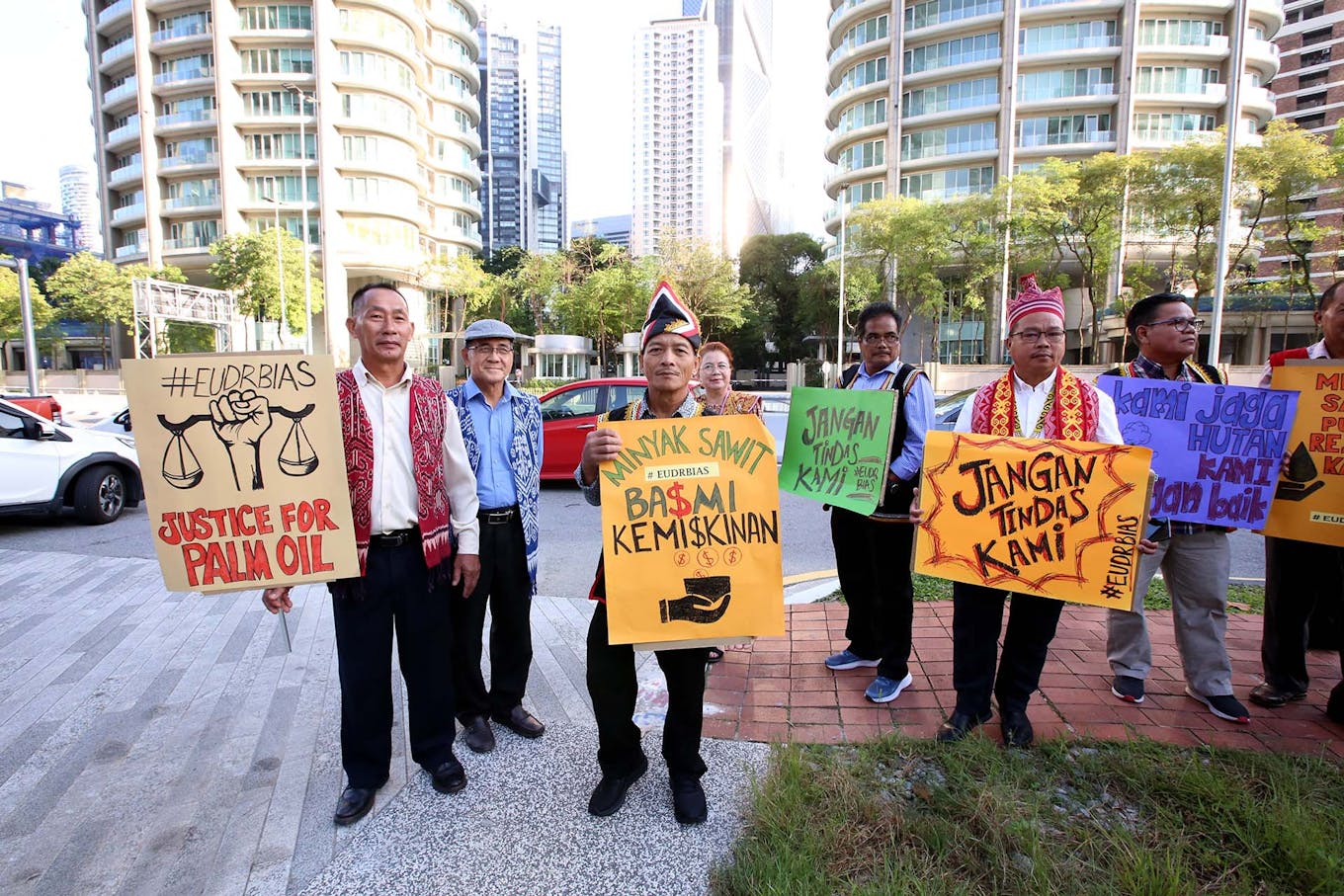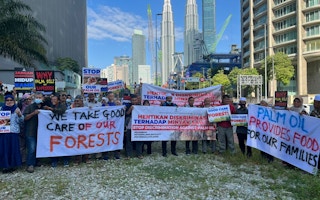Sustainability certification schemes for palm oil risk becoming irrelevant if they do not respond to industry developments such as the European Union’s new anti-deforestation law, said a leading grower.
To continue reading, subscribe to Eco‑Business.
There's something for everyone. We offer a range of subscription plans.
- Access our stories and receive our Insights Weekly newsletter with the free EB Member plan.
- Unlock unlimited access to our content and archive with EB Circle.
- Publish your content with EB Premium.
“If people are being told that [voluntary certification schemes] are not going to help you meet regulatory requirements, then they are going to drop it,” said Perpetua George, general manager for sustainability at Wilmar International, one of the world’s largest oil palm companies, at a recent industry conference in Malaysia.
Speaking to Eco-Business, George explained that the EU deforestation-free regulation has forced palm oil players to implement traceability systems that go beyond what is now required by certification schemes, especially voluntary ones like certification scheme Roundtable for Sustainable Palm Oil (RSPO), which has 5,000 members as of 2021. Other voluntary palm oil sustainability certification schemes include the International Sustainability and Carbon Certification.
“What is happening now is that companies are having to put together their own [measures] in order to meet these requirements,” she said, highlighting that these include appointing staff to handle traceability-related matters, satellite monitoring and implementing grievance procedures.
The RSPO’s ‘no deforestation’ standard was introduced in 2018 and incorporates the High Carbon Stock Approach methodology. However, the EU’s deforestation law, which seeks to prevent commodities linked to deforestation from being imported into the European market, places greater responsibility on producers of palm oil to assure traceability to plot level and prove that they are in compliance with the new requirements.

Malaysia’s low deforestation rate with regards to palm oil is one of the reasons the industry is at low risk of running afoul of the European Union’s new anti-deforestation law, said Wilmar International general manager for sustainability, Perpetua George (centre). She was speaking on a panel at Bursa Malaysia’s annual Palm and Lauric Oils Conference and Exhibition in March 2023. Image: Bursa Malaysia
In response to George, who brought up the question of the RSPO’s continued relevance on a panel at the Palm and Lauric Oils Price Outlook Conference, RSPO chief executive officer Joseph D’Cruz said that well-designed sustainable palm oil standards would act as a “measuring tape” that demonstrates how palm oil players are reaching the bar set by governments and regulators.
“We don’t control the goalposts. We don’t own the bar. What we can do as a member-driven organisation is to understand where those expectations are going and respond to them,” he said. “Because this is such a large industry with so many actors, we will always need to have some mechanism by which we can compare different players.”
RSPO’s role and its relevance, which D’Cruz defended, extends beyond the legalisation of sustainability-related rules, he told Eco-Business.
“The space [that RSPO remains relevant in] is not so much battling these sorts of regulations but building on them. The minute some of these issues become regulatory requirements, compliance is the first priority for companies, which is fine. In a sense, we can tick it off as ‘mission accomplished’,” he said.
“Where we don’t have regulatory requirements – like Scope 3 reporting of carbon emissions or how we deal with emerging issues in labour – that, I think, is where the space for conversation is for us,” D’Cruz said.
RSPO voiced its support for the EU deforestation-free regulation in December 2022 when the law was passed by the EU.
Data management needed
The RSPO’s standards are currently being reviewed under its five-year review cycle and are set to be tabled for adoption by end-2023. The first public consultation on the revised standards was completed in December 2022 and its technical committee is reviewing the inputs for an internal taskforce meeting later this month, D’Cruz told Eco-Business.
“We are building up to make sure that by [our next roundtable in November], we have a clear sense of what we need to address, where we need to challenge ourselves with higher standards or where we need to develop clearer metrics and indicators, so that the industry can demonstrate that they are in compliance with, for example, the deforestation regulations,” he said.
For most landscapes in which RSPO members operate, however, deforestation is not the problem, said D’Cruz. More than 80 per cent of the world’s palm oil is produced in Indonesia and Malaysia, although as of November 2022, less than 1 per cent of Malasian oil palm smallholders were RSPO-certified.
“Proving no deforestation in the way we are being asked to prove it is the question,” he said.
Wilmar’s George, however, points out that deforestation rates with regards to palm oil in Malaysia have always been low, one among several factors that should make the country a ‘low-risk’ one under the benchmarking system of the EU’s deforestation-free regulation. The risk cateogry determines the level of obligations that operators and authorities must comply with, with low-risk countries subject to simplified due diligence. Malaysia is currently categorised as high risk.
Malaysian palm oil players are also required by law to be certified under the Malaysian Sustainable Palm Oil (MSPO) scheme, a necessary component of licenses issued by the Malaysian Palm Oil Board, George highlighted. This means that the country’s palm oil ecosystem is data-rich, with information on actors from smallholders to dealers and refiners. Indonesian palm oil producers are similarly required to be certified under the Indonesian Sustainable Palm Oil (ISPO) scheme.
“We have the data…from smallholders buying and selling within the dealer structure, all the way to refineries,” she said. “I think it is important to talk about that because when we are trying to address cross-cutting, bipartisan issues, those require a collectiveness, a coming together to work on it.”

Malaysian palm oil smallholders participated in a peaceful gathering to voice their protest against the European Union’s deforestation regulation. The placards in Malay translate to, “Palm oil eradicates poverty” and “Do not oppress us”. Image: Malaysian Palm Oil Council/ Facebook
The EU deforestation law has been criticised by palm oil producers in the commodity’s biggest producer countries, Indonesia and Malaysia. On Wednesday (15 Mar), more than 500 Malaysian oil palm smallholders signed a petition demanding that the EU review its deforestation regulation. They said the new rules contained “unjust targeting and protectionist measures.”
The petition was supported by five of the country’s promient agricultural organisations, including the Federal Land Development Authority, Federal Land Consolidation and Rehabilitation Authority and National Association of Smallholders Malaysia.
“Hundreds of thousands of small farmers in Malaysia have relied on successful palm oil and rubber exports to lift them out of poverty and support the sustainability of rural communities. The EU deforestation regulation’s unilateral and unrealistic demands on traceability and geolocation will prevent these farmers from accessing the European market,” the organsiations said in a press statement.
What is needed now is for the palm oil industry to organise itself and the wealth of data being collected by certification schemes and local authorities, said Khor Yu Leng, senior economist at boutique consultancy Segi Enam Advisors who also spoke on the conference’s panel and echoed George’s call for industry-wide collaboration.
Palm oil players who are already collecting and supplying data to fulfil the requirements of existing sustainability certification schemes such as MSPO and RSPO just need assistance in upgrading that data to meet requirements under the EU’s deforestation regulation, she said.
“Certification is not a green lane [when it comes to complying with new regulations], but we just need to map the existing data to these new requirements,” she said.
An earlier version of this article said that the Indonesia Sustainable Palm Oil certfication is voluntary, instead of mandatory. The error is regretted.










